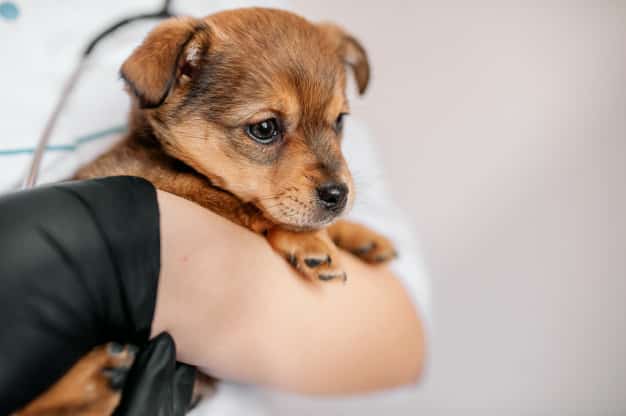Dogs rely on specific types of food, which is why the market is flooded with different dog foods depending on the size, age, and breed of the dog.
Dogs are susceptible to some food items. And just like humans, they can have an allergic reaction to foods.
Dog’s immune system may not corporate with some types of food and would consider it harmful.
Different dogs respond to different foods differently. Their immune system responds with the antibodies, and it triggers dangerous and abnormal symptoms in dogs.

Many common symptoms in dogs with food allergies
- Chronic ear inflammation or ear pain
- Itching on their body
- Constant paw biting
- Poor coat and skin quality
- Constant licking
- Skin rashes
- Diarrhea
- Nausea and vomiting
- Stomach infections or food poisoning
- Hives
- Irritation
If your dog experiences some of these symptoms, it could be that he is allergic to a specific food item and not a victim of some underlying health problem.
If you notice these problems in your dog, it is fundamentally important to have an experienced medical professional to look into the matter to detect the cause of such symptoms.
Things could take a severe turn if your dog is exposed to the allergen for too long, and a severe reaction could very well occur. It could even be life-threatening in the long run if they continue to eat such food items.
Are food allergies common in dogs?
It is said that ten percent of allergic cases in dogs are from food. Dogs do suffer from food intolerance, but food allergies are different.
If your dog is continuously licking themselves after consuming something, they are likely allergic to that food. Gastrointestinal problems are also common in dogs with allergies and food intolerance.

What are the food items that could trigger allergies in dogs?
Sometimes, allergies could be a genetic problem, one that the dog is born with. And when it is triggered, it is usually because the dog is exposed to something he is allergic to.
Some of the most common items that cause allergies in dogs are beef, dairy products, wheat, eggs, lamb, pork, fish, chicken, milk, soy, and more.
Some dogs are allergic to more than one food item carrying the same or different properties.
What are the causes of food allergies in dogs?
The causes of food allergies could be multi-factorial thin. However, a dog must have a genetic disposition to develop and adopt these food allergies.
The environment the dog is living in can also affect them and trigger the allergies. Continued studies are going on to determine what makes the immune system of dogs allergic to food items.
Allergies generally occur during infanthood or the first few weeks of life of dogs.
Many young dogs that are treated with antibiotics could also develop allergies later in life as antibiotics change the environment inside the stomach and intestines.
That is one of the most common causes of why dogs have allergies.
Different dog breeds and allergies
Dogs come in different breeds and sizes, and allergies indeed affect dogs of various breeds differently.
It can also depend on the geographical and physical factors that primarily cause dog allergies.
It also depends on the place where the dogs are being bred and under what circumstances.
These lost common breeds in which who may find food allergies are retrievers, Dachshunds, cocker spaniels, German shepherds.

How to know if the dog has food allergies?
The most straightforward way to determine whether your dog has a food allergy or some other health condition is by changing the diet plan of the dog to see how the new diet affects it.
If your dog is on a specific diet, and you notice the abnormal symptoms in his behavior, you can start by eliminating one food item from his diet and check the behavior.
If it continues, eliminate the second food item and then check. Continue until you find out which food item triggers those symptoms in your dog.
After this, change the diet entirely. When you see noticeable differences in the dog’s behavior, start to reintroduce the old food items into your dog’s diet plan gradually, one by one.
You will understand as soon as you start to see the old patterns and detect which food item doesn’t suit your dog’s immune system.
This process may take from days to a week to fully reach an outcome and understand the results.
There are other more professionally and medically advanced options that you can turn to detect the allergies.
For example, you can take a sample of the discharge from the war if a dog or do skin testing to see for any problems.
A professional doctor specializing in animal healthcare will help you detect the issue with your dog.
A practitioner might even use blood samples to determine the root cause of the symptoms your dog is showing.
Always remember that some dogs are extremely sensitive to changes in their diet. It might cause allergic reactions to them.
Make sure that whatever you are feeding your dog is dog-friendly, and the process of changing the diet is slow and patient.
Asking a medical expert before making a diet change is recommended.

Sudden allergic triggers in dogs
Sometimes, dogs get allergic to food items they have been consuming for years all of a sudden. This is common in food-allergic dogs. However, such allergies are not very dramatic.
If you notice that a particular diet plan is improving the dog’s clinical symptoms and you can find the food the dog can tolerate, then you must rotate the diet every three to four months.
You must keep your dogs’ condition stable for a good amount of time before you start to test the allergic reactions and how they react to different food items.
What to do with a dog with a food allergy?
You must stick to food that is light, easy to digest, and that is likely not to be too heavy on the dog’s digestive system.
You can use medication to subside the symptoms but contacting a healthcare professional.
Using herds and putting it in the dog food might also help. If the symptoms are prolonged, wait no lot and visit the vet nearest to you and get your dog checked to avoid bigger health problems.
Is homemade food good for dogs with food allergies?
There are many advantages to cooking food for your dog by yourself and at home. The ingredients are fresh and not preserved.
You get to control how you cook it and what you add in the food. It is important to follow all the guidelines when it comes to preparing food for your dog.
A balanced diet is a must for any living being, and your dog doesn’t stand out. Though there is nothing very magical about raw diet or home-cooked food, it is better as it is clean and hygienic.
Some dogs react very well to home-cooked food and raw supplements.
The protein is different in home-cooked food than the processed food in the departments, and that could make a huge difference in the dogs.
Everyone should try out a raw diet plan for their dogs to see how it works out for them.

How to prevent allergies in dogs?
If your dog is born with an intolerance to a certain food item or environmental condition, there is little that can be done to prevent or avoid it as the dog has already developed an allergy.
The key to a perfect diet for your dog is that there must be variety in the diet you provide to the dogs, and there should be an organic shift in the diet to maintain their overall well being.
Sometimes, sticking to one particular food can also make them intolerant to the most basic dog foods as they never get a chance to get used to it.
Puppies should be put on probiotics to avoid developing allergies later on. Antibiotics can cause severe reactions that may lead to allergies in dogs.
Puppies have a weaker immune system, and taking care of it at the growing stage is very crucial.
Try to avoid giving your dog antibiotics until he is of six months or older. Give them a diet that has a variety to make their immune system stronger.
What is the best food for dogs with allergies?
Sometimes, pet owners do need professional advice when it comes to taking care of their pet dogs.
It is significant to work with a veterinarian to identify the best food out there for your dog.
Some food items are available only with a proper prescription. You must always take into consideration the advice of a nutritionist before making a significant diet change for your dog.
Changing diets can cause nutritional imbalance without any changes in detecting the underlying problems. For better care, always visit a veterinarian for the best possible advice.
